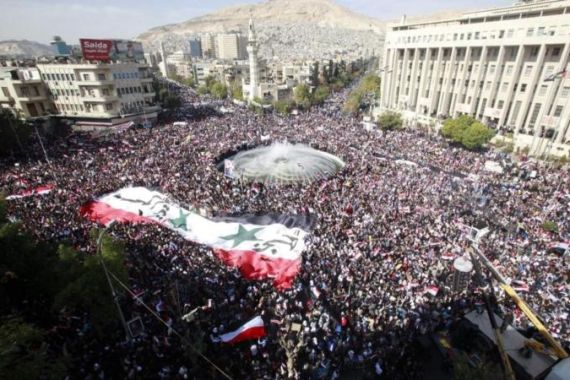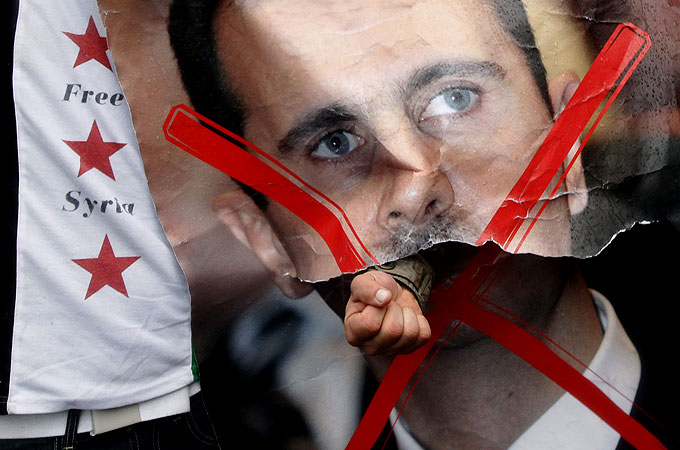Fast-forward Syria: Three terrible scenarios and one good option
Syria’s uprising could end up looking like Libya, Algeria, Kosovo, or perhaps something different altogether.

 |
|
The Assad family has ruled Syria for more than four decades, relying on ‘repression and injustice’ [AFP] |
As the Syrian revolution enters its second year, three scenarios loom on the horizon. However, as they say in Arabic: “their sweetest is bitter”.
What started a year ago as a peaceful protest in the southern town of Dera’a demanding limited reform, has morphed into a popular uprising demanding sweeping changes, mutating into a national upheaval calling for regime change.
With its back to the wall, the Syrian regime rejected all compromise with the opposition and prepared itself for a violent cross country crackdown.
The balance sheet is hardly encouraging. With more than eight thousand Syrians dead, a quarter of a million displaced and countless imprisoned or tortured, the opposition is arming itself in self-defence and its regional supporters are chipping in with western complicity.
In recent days, the regime has made some tactical advances against opposition strongholds in Homs and Idlib, giving President Bashar al-Assad and his cronies a renewed sense of confidence.
The Syrian regime’s cold and calculated strategy has proved far more potent than what fallen dictators in Libya or Tunisia could muster.
It speaks of reform and uses measured language to cover up for its excessive force and to deny Western powers the alibi to intervene.
But time is NOT on Assad’s side. Nor is it for that matter on Syria’s side.
The arming of Syria’s popular opposition despite the crackdown has for all practical purpose torpedoed the regime’s deterrence and undermined its military gains.
Alas, thousands more are bound to die and Syria could descend into civil war if the nation’s wrong-headed leadership doesn’t draw the right conclusions.
If 2011 was a divisive year, 2012 might prove decisive.
The people are showing formidable capacity to withstand the crackdown and organise.
Time is on the side of those willing to sacrifice everything for a free nation, not those willing to sacrifice their nation for their own privileges.
As the two sides are vying for greater outside support, Iran, Russia and China on one side, the majority of the Arab league, Turkey and Western nations on the other. Time is a luxury Syria can’t afford.
The Algerian scenario
Two decades ago, the secular military regime in Algeria was able to crack down hard on the opposition, following its substantial electoral gains – thanks, in no small measure, to the explicit support of France and the implicit support of the US.
The deaths of tens of thousands of civilians and security forces were “justified” in Western circles on the basis of the right of a regime to fight terrorists and extremists within a sovereign country.
The Assad regime hopes Russia and China will provide it with a similar cover to “finish the job”.
It reckons Moscow’s veto at the UN Security Council will translate into a strategic veto against any foreign/Western military intervention in the eastern Mediterranean.
Assad calculates such Russian backing allows the Syrian Elite Forces and Republican Guards to successfully crackdown on the revolution just as the French backed the Algerian Generals to purge the opposition.
Then as now, Western, Russian and Chinese leaders share little political or moral quarrels about Arab civilian deaths or “collateral damage”. (For the record, I think “collateral damage” is the most despicable phrase in the English language; a euphemism apparently first used during the Vietnam War.)
Unlike Algeria’s opposition in 1992, the 2012 Syrian uprising will not defeated through force.
Times have changed. The revolution of consciousness that has swept through the region over the last year has picked up momentum in Syria and can’t be defeated by violence.
Alas, by the time they realise this, it might be too late.
The Libyan scenario
Syrian opposition leaders are hopeful Arab/Gulf pressure, recent declarations and visits by Russian and Chinese diplomats to the region, and mounting pressure from Western nations on their UNSC counterparts in light of the spiralling of violence in Syria, could lead to greater consensus in the international community in favor of isolating the Syrian regime.
Increasing numbers of Syrian opposition leaders hope that serious overtures towards Moscow and Beijing will lead to consensus around foreign military intervention under the “Right to Protect” on the Libyan model that includes a no-fly zone.
If between 25,000 and 40,000 Libyans died after the NATO intervention, the number of deaths in Syria is bound to be higher.
It’s also far from clear whether the regime will cow and implode from within as a result of military bombardments.
More importantly, neutralising Syria’s air defences including the bombing of its land-to-air missiles and radar centers, is bound to alter the Middle East’s strategic equation, leaving Iran exposed and Israel enforced.
It could also enforce claims of a US/Israeli conspiracy against the Assad regime and lead to a widespread backlash in the region.
All of this assumes that NATO is willing to enter the Syrian quagmire today. I doubt it.
Which takes me to the third scenario.
Back to the future: The ‘Syrbian nightmare’
As the regime builds on the Algerian scenario and many in the opposition bet on the Libyan scenario, regional and Western powers might entertain a Serbia/Kosovo like scenario.
Back in the late 1990s, Kosovo’s opposition to Belgrade was armed and for a whole year. In 1998-1999, it fought against the Serb government. When the humanitarian and security situation deteriorated, a Western led “Coalition of the Willing” intervened militarily without a UN Security Council resolution that Moscow was likely to veto.
Seventy eight days of US bombardment followed by NATO direct intervention and the division of the country. They argued their decision was “legitimate” even if it wasn’t necessarily legal.
Something similar is building up in Syria. Growing effort to finance and arm the opposition, coupled with diplomatic pressure to isolate Damascus, could pave the way towards discrediting and weakening the regime.
Humanitarian deterioration could then be used as a legitimate alibi for military intervention on the line of Serbia/Kosovo (even Bosnia) with potentially similar results: ethnic cleansing, breakup, and sectarianism.
While I doubt Syria would break-up like the former Yugoslavia, the nightmare would be no less horrific.
Assad, and the test of patriotism
The Syrian revolution has taken far longer than the other Arab revolutions due to the regime’s unity and divisions in the opposition.
Despite its secular-nationalist rhetoric, which shouldn’t be discounted nor underestimated as source of legitimacy in a country like Syria or in the Mashreq (East) in general, the regime has based its power mostly on sectarian and personal loyalties.
For more than four decades the regime has made sure there is no day light between leader, family, clan, sect, regime, army and state.
These layers of power have secured the position of Assad family and clan at the helm of the country. But it also led to terrible repression and injustice.
Contrary to conventional wisdom, no less Sunnis benefited from the regime than Alawaites. Indeed many if not most Alawaites remain marginal and poor in Assad’s Syria.
As the country slides into civil war, it’s high time to reverse the direction of loyalty. Instead of sacrificing clan, sect and country for the leader, the latter must give up his authority to save the country he claims to love and defend.
Ultimately, when the chips are down, personal sacrifice for public good is the test of patriotism.
Otherwise, clan and the Alawaite minority, and military must sacrifice the dictator for the sake of future unity, peace and justice in the country.
Indeed, they need to do it for their own sake.
For more on Syria and the future scenario, watch EMPIRE: Syria on the Brink, this week on Al Jazeera.
Marwan Bishara is Al Jazeera’s senior political analyst and the author of The Invisible Arab: The promise and peril of the Arab revolutions, now available in bookstores.
Follow him on Twitter: @MarwanBishara
